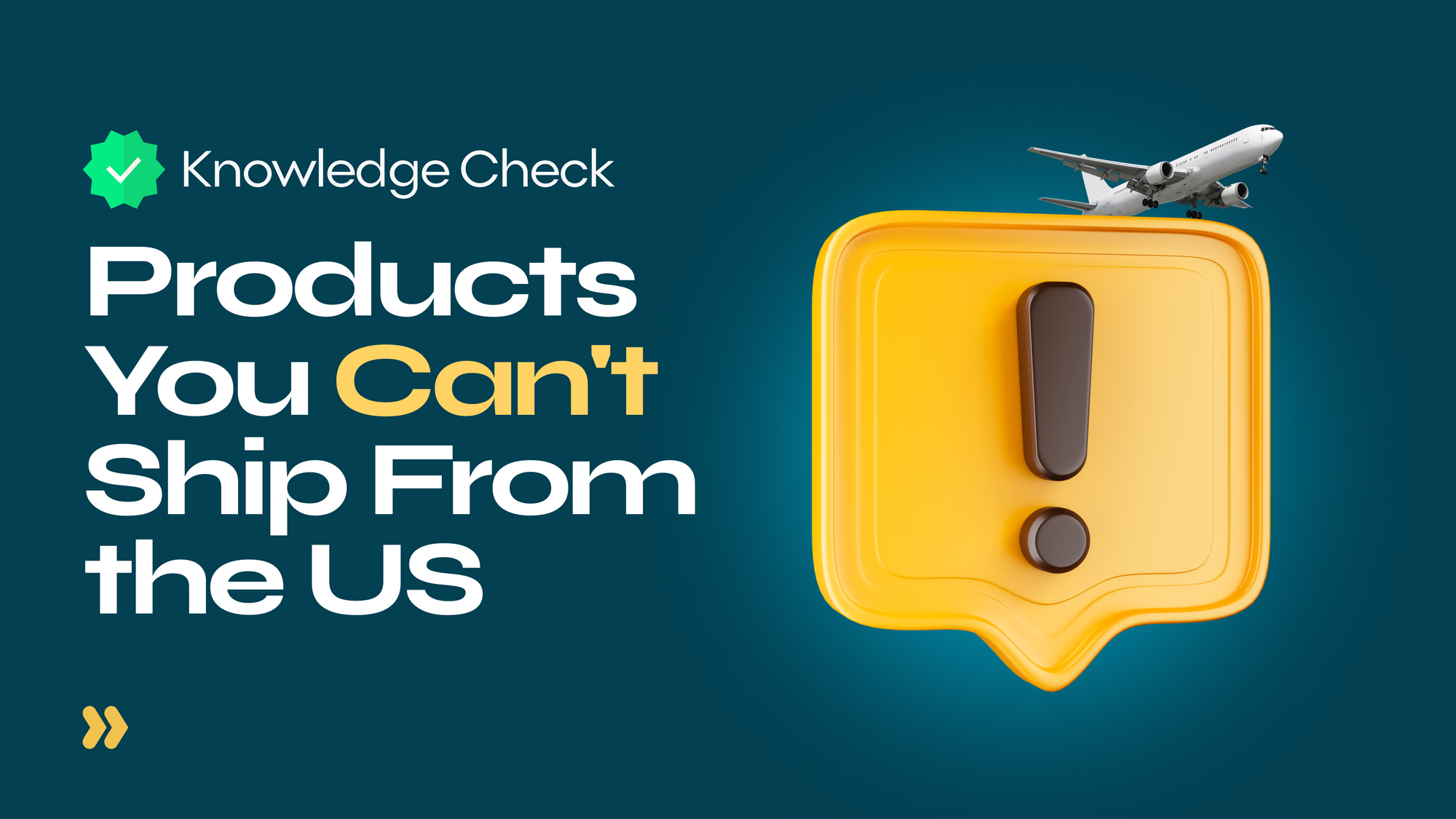Knowledge Check: Products You Can't Ship From the US

What would you do if, after getting excited about shipping some items, you suddenly find out that you can't send them from the US? It's a frustrating situation that many people encounter when trying to send specific items internationally.
Understanding what can and cannot be shipped is crucial for a smooth shipping experience. This article will explore a range of items with restrictions or outright prohibitions on shipping from the United States. This knowledge will save you time, effort, and potential disappointment, ensuring your shipping endeavours are successful and compliant with regulations.
Hazardous Materials:
Hazardous materials are defined as any substance or material that has the potential to cause harm to people, property, or the environment. This can include explosives, flammable materials, gasses, and corrosives.
Explosives
This category includes items that have the potential to detonate or explode under certain conditions. This includes fireworks, ammunition, and industrial explosives.
Flammable Materials
These are substances that can ignite and burn easily. This category includes fuels, paints, solvents, and certain chemicals.
Gasses
Gasses can be highly pressurized or compressed and can pose risks due to their potential to leak, explode, or cause harm through inhalation. Examples include compressed gasses like propane or oxygen.
Corrosives
Corrosive materials can cause damage or deterioration to other substances upon contact. This includes strong acids, alkalis, and certain cleaning chemicals.
While most hazardous materials are outright prohibited, others are restricted. This means that for them to be shipped, strict regulations must be put in place to ensure they don't endanger the public and the environment.
One primary objective of these regulations is to reduce the risks associated with transporting hazardous materials. This involves comprehensive packaging standards that are specifically designed to contain and protect these substances during transit. Additionally, labelling and marking requirements are in place to provide clear identification of hazardous materials for carriers, handlers, and emergency responders.
Controlled Substances:
These are drugs whose usage is controlled by the government. It includes a wide range of substances, from illicit narcotics to strictly regulated drugs.
Illegal drugs, such as cocaine, heroin, and methamphetamine, are expressly forbidden from being shipped across international borders. This clear stance is necessary in the fight against drug trafficking, which is a significant threat to public health and the well-being of society.
Attempting to go over these regulations and still ship these prohibited substances can lead to heavy fines and sometimes prison. It can also cause a dent in one's reputation and could affect future opportunities and business dealings.
Firearms and Ammunition:
On this list, firearms and ammunition have strong regulations surrounding their shipping. While it is mostly prohibited, strict rules and regulations apply in cases where they must be shipped.
Government agencies, such as the Bureau of Alcohol, Tobacco, Firearms and Explosives (ATF), have a critical role in overseeing the shipping of firearms and ammunition. They closely monitor and enforce the regulations to ensure these items don't end up in the wrong hands or contribute to illegal activities.
These regulations are in place to maintain public safety and prevent firearms and ammunition from being mishandled or misused. Keeping to these restrictions helps to uphold the integrity of the shipping industry and protect the well-being of communities.
Alcohol and Tobacco Products:
If you want to ship alcohol and tobacco products from the United States, strong restrictions exist because of public health and the legal nature of these items.
Shipping alcoholic beverages and tobacco products is tightly regulated in the US. These restrictions are put in place to address a range of concerns, including ensuring that these products are distributed and consumed in a legal and controlled manner.
For shipping alcohol, various federal and state agencies are involved. The Alcohol and Tobacco Tax and Trade Bureau (TTB) at the federal level sets forth guidelines and requirements. Additionally, individual states have their regulations regarding the importation of alcoholic beverages. This means compliance with federal and state-level requirements is essential for legal alcohol shipping.
Tobacco products are overseen by several agencies, including the Food and Drug Administration (FDA) and the Alcohol and Tobacco Tax and Trade Bureau (TTB). These agencies have established a set of rules and guidelines for the manufacture, labelling, and distribution of tobacco products.
To legally ship alcohol and tobacco products, businesses and individuals often need special licenses or permits. Federal and state authorities issue these licenses, which are important for demonstrating compliance with the strict regulations surrounding the shipment of these goods.
Perishable Items:
When it comes to shipping items, particularly perishable goods like fresh fruits, vegetables, and certain dairy products, there are strict regulations in place. These rules exist to protect public health and safety. The reason behind this lies in the perishable nature of these goods. They can spoil or deteriorate over time, and if not handled correctly, they can become a health hazard.
Fresh fruits, vegetables, and certain dairy products are regulated precisely because they have a limited shelf life. They can become contaminated or spoiled when not properly handled during shipping, leading to foodborne illnesses. Bacteria and other pathogens can multiply quickly, posing significant health risks to consumers.
Moreover, inadequate temperature control during transit can accelerate the decay process. This can not only result in financial losses for businesses but can also compromise the quality and safety of the products.
By regulating the shipping of perishable items, authorities aim to ensure that these goods reach consumers in a safe, wholesome condition. It also supports fair competition by preventing the entry of potentially substandard or unsafe products into the marketplace.
Live Animals:
Shipping live animals in the United States is strictly regulated and, in many cases, even prohibited. This is primarily due to the welfare and well-being of the animals themselves.
Live animals have specific needs, including appropriate living conditions, temperature, and access to food and water. The stresses of shipping, especially over long distances, can lead to significant discomfort and potential harm to the animals.
Transporting live animals also presents risks of injury, illness, or even death due to factors such as rough handling, temperature change, or inadequate ventilation.
While there are general prohibitions on shipping live animals, there are exceptions for certain situations. These exemptions usually require compliance with specific guidelines and may be subject to approval from relevant authorities. For example, zoos, research facilities, and some specialized breeders may have protocols in place to ensure the safe and humane transport of animals.
Counterfeit Goods:
Shipping counterfeit or fake products is a serious offence. Counterfeit goods are unauthorized replicas of genuine products, often designed to mimic the appearance and branding of well-known brands.
Shipping such products is illegal because it infringes on intellectual property rights, including trademarks, copyrights, and patents. It also undermines consumer trust in legitimate products and can pose safety risks, especially in industries like pharmaceuticals or electronics.
Individuals or businesses caught shipping counterfeit goods can face severe legal consequences, including lawsuits, criminal charges, seizure of the goods and even loss of business permits and licenses.
Money:
When it comes to shipping items from the United States, some significant restrictions exist for money, currency, and lottery tickets. These regulations are designed to address legal, financial, and security concerns.
Shipping large amounts of currency or monetary instruments is subject to strict reporting requirements. The U.S. government mandates that any individual or business sending or receiving over $10,000 in cash or monetary instruments must declare it to the U.S. Customs and Border Protection (CBP). This reporting ensures transparency and helps prevent money laundering and illicit financial activities.
Shipping Restrictions: When Heroshe Might Not Be the Right Fit
International shipments can be a complete task when it comes to items that have specific restrictions. While Heroshe has been a reliable shipping partner over the years, there are certain categories of items we do not ship due to legal and safety concerns.
Examples of such items include hazardous materials, firearms, and perishable items.
Related: Can I Ship That? A Comprehensive List of Items Heroshe Ships (And Doesn't)
If you want to ship items within this restricted category, exploring alternative shipping options to cater to these items is best. These alternative shipping options have the resources to ensure that you comply with all the necessary rules and regulations while also ensuring the safety and legality of your shipment so you won't get into trouble.
Final Thoughts
A successful shipping experience depends on understanding what can and cannot be shipped from the US. The restrictions and prohibitions for a wide array of products uphold safety standards for public health and ethical standards that help safeguard human relationships.
As the years go by and as regulations evolve, it is necessary that you stay informed at all times. Check-in with the relevant authorities or your shipping carrier for up-to-date information on shipping restrictions. This helps ensure that your shipping activities comply with the laws of the land.
At the end of the day, it's a full circle. Keeping to these guidelines can contribute to a safer and more secure global shipping environment that benefits other individuals and society.
If you found this helpful, subscribe to the Heroshe blog for more insightful content.

